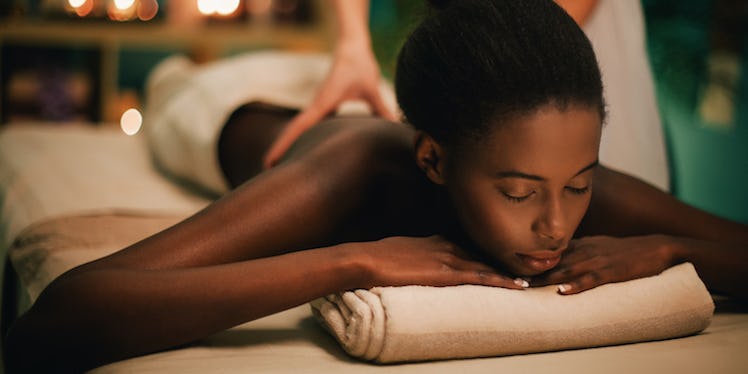
This Is Why Massages Should Definitely Be Part Of Your Workout Recovery
One of my favorite parts about being a dancer was how body-work and massage were regularly worked into our routines.
Especially as a modern dancer, doing lots of floor work and jumping and lifting, my muscles definitely needed a release by the end of the day.
Luckily, I had my fellow dancers to rely on, and vice versa.
Since we were all pretty interested in anatomy (not to mention our muscles were all usually very sore), we habitually traded massage techniques with one another.
It definitely taught me firsthand why releasing and relaxing the muscles is absolutely just as important for their health as stretching, strengthening, and moving them.
Not to mention, it feels freaking fantastic.
It turns out, there's a lot of great stuff that happens to your body when you get a massage.
For people who tend to exercise a lot, massages are excellent for both preventing and treating injuries.
While sometimes working out those knots can cause a little soreness the next day, massage increases the blood flow and oxygen in the muscles and decreases the lactic acid build-up, and the onset of muscle soreness.
This also means you can recover faster from a really tough workout, which, of course, means you can get back to your grind that much faster.
Elite Daily spoke with Amy Montia, LMT, a practitioner with Physio Logic in New York City, who says a simple massage really can expedite recovery of overworked muscles "by promoting circulation of oxygenated blood and lymphatic fluid."
She explains,
Massage therapists can release trigger points and nerve entrapments, as well as restore fascial matrix flexibility and realign muscle fibers with myofascial release. Regular massage therapy is a great way to monitor [your body] and address immediately any issues that arise before they become something bigger and more difficult to treat.
Plus, according to a 2012 study published in Science Translational Medicine, even just a 10-minute Swedish massage can reduce muscular inflammation.
Researchers in the study took tissue samples from men's legs after high-intensity workouts, some of whom received a 10-minute massages post-workout, and some of whom didn't.
The tissues from the "massaged" samples had much less of an "NF-kB" protein, which causes an inflammatory response.
A massage can also increase circulation in the lymphatic system, a series of organs and tissues that release and filter toxins from the bod.
Pretty groovy, right?
Massages are also an important part of a workout routine because, when muscles are used a lot, they can start to lose the ability to relax.
When you strenuously and frequently use your muscles (like, say, if you're really into weight-lifting), they can become chronically tight or hypertonic, which can make you more susceptible to tears and pulls.
Relaxing and loosening muscles increases flexibility and range of motion in the joints, and helps to reduce swelling.
To put it really simply, making your muscles less stiff is really good for moving them around.
Keep in mind, too, that it's not totally necessary to splurge on an expensive trip to the spa to reap the post-workout benefits of a massage.
Enlist a friend, or better yet, find a lover to help you out.
Wink, wink.